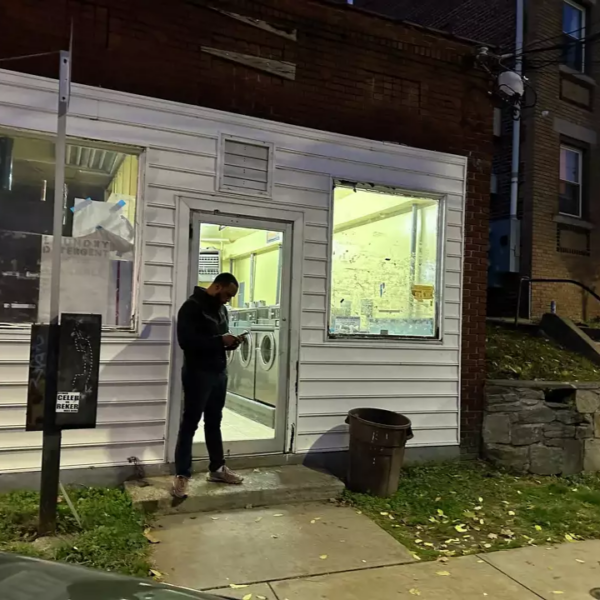How a CT Man Rose From Homelessness to Leadership

This is a summary of an op-ed by By Hearst CTInsider Columnist
Everything is connected, Joshua Brown likes to say. “Life is so full of circles.” That idea rings clearly as he stands in his sparse, second-floor office at a downtown Stamford jobs center.
Not many years ago he was in the same location, in a very different place.
Brown, 35, steers people in need of work to training or entry-level positions for Career Resources Inc., a nonprofit. He also runs an outreach program for a youth development agency, Domus Kids. And he owns Brown All Around Trucking, with three trucks and six drivers, hauling goods for the Pentagon, Amazon and others.
Six years ago he left his job at a bank, where he had been a branch manager and vice president.
As Brown dispatches loads on his phone and tracks down teens on the streets, he thinks about a very different past — as a kid bouncing from shelter to shelter, sleeping in laundromats, under bridges, at friends’ houses, in abandoned buildings and in the brown-and-white Dodge minivan that he, his mother, brother and sister called “the Scooby-Doo van.”
Always, he kept his nomadic life a secret. The family stayed together, his mother refusing public assistance for fear of losing her kids.
Brown points at the ceiling. “Upstairs from my office, the room I’m in now, was actually my bedroom. Me and my brother….I stayed here six years, on and off.”
“Stayed here.” Not “lived here.” No one could visit. They had a strict curfew. It was called St. Luke’s LifeWorks and it’s still a shelter, now called Inspiritus. “It didn’t feel like home but every day we made the best of it,” he said.
On Wednesday at the state Capitol, Brown was named by the Connecticut Conference of Municipalities as one of three co-chairs of the “119K Commission,” so named for its goal of reaching some of the 119,000 teens and young adults who are high school dropouts, in danger of exiting school, or unconnected to work.
He is, in a real sense, finding himself. “I say to you kids, I am you. You are me,” Brown said at a forum organized by the conference of municipalities at Mohegan Sun last fall.
I joined Josh Brown for a tour of his past and present world in downtown and the south end of Stamford as he told stories with names, facts and dates as if he were narrating a John Steinbeck novel.
Landmarks in the old haunts take on new meaning, like the cemetery just outside the windows of his office, just outside the Inspiritus shelter, where two kids he’s now working with have been staying.
“Every day we looked out at the graveyard. You’ve got to look at the dead every day,” he said, “and you’re not living. You’re barely living.”
Brown recounts that he missed 400 days of classes in just a few years and was kicked out of two high schools. “They couldn’t track me and they couldn’t control me.”
When he was age 8, his father died at 60. His mother, then around 30, drank and gambled. Young Josh had no trouble with academic work when he showed up and focused. But for a kid who’s hungry, homeless and restless, that’s not often.
“He couldn’t sit still, there was fighting, there was yelling,” said Mike Duggan, the longtime executive director of Domus, who brought Brown and his older brother into a Domus-run middle school back in 1999 and has known them ever since. One time, Duggan recalled, “he and his brother tried to leave school. They jumped out of a window.”
Even his closest friends didn’t know the family had no home. He would spend time in his best friend’s house and the father, who owned local businesses, suspected the truth. He would offer rides but Josh would always say, “I like to walk.”
“Where you walk to?”
“Home.”
“Is everything okay?”
“Of course everything is all right.”
His mother valued family unity over any comforts. She feared the state would remove the kids if she joined the grid and signed up for housing vouchers, HUSKY health care or even food stamps. His younger sister, who now holds two masters degrees and owns a transitional house for people in addiction treatment in Virginia, was in fact removed for a time. She returned when their mother found an apartment — which, as usual, didn’t last.
“We’re homeless and we’re struggling but we’re going to be homeless together,” he remembers his mother saying. “We would go over to the old folks home, the convalescent home, and take showers. You’d get up and go like nothing was going on, and go to school.”
One day, Duggan followed the Brown brothers after they left the Domus school. “So I found out they were living under a bridge,” Duggan said.
He arranged for them to find an apartment. They stayed in programs at Domus for the most part but the home didn’t last as their mother worked only sporadically, perhaps cleaning offices at Pitney Bowes, perhaps as a low-paid assistant in a hospital.
Duggan and Domus take a long view, with the tagline, “Love lives here” and a style that backs that up as I could see at the Domus center in Stamford, where Brown is among about ten staffers who were part of Domus in their youth. The philosophy: No excuses based on your circumstances. Do the work.
What set Josh Brown toward success, as with others who pass through Domus, was his desire for a better life and his willingness to accept coaching, Duggan said.
“It’s the long game, that’s what works,” Duggan said. “If it took him 12 years to get like that then it’s 12 years to undo it.”
Brown stayed with it and graduated high school through a Domus program, then learned from Tom Langan, now his supervisor at Domus, how to drive. He borrowed money for a car and landed a job at a bank.
Bootleggers, prostitutes and junkies
Driving along Canal Street in the south end of town, we pass the bank branch he managed, then First Niagara. We hit a deli, where the clerk gives Brown some food and they talk about kids. Then a community center where we walk through the basketball court.
“This is my stomping grounds,” he said — and it still is, though he lives in Norwalk, where he owns a house.
We see a half-dozen teenagers sitting on a curb. “They need something to do,” he said, adding that in youth services, they’re not profiling kids, not judging.
On Ludlow Street, we pass a rooming house where the family had a stable apartment for a time until a fire burned them out.
“Many times we stayed in this laundromat here and I’m not ashamed,” he said. We walk inside where a man sits in the back. Brown points to two machines in front of a wall that was once the entrance to a back room, where the family would sometimes stay.
We keep driving. “Damn, we stayed here too,” Brown said, often. On Manhattan Street, we see a building, now abandoned, that was a furniture store owned by a father and son — or was it the bar run by a bootlegger friend of Josh’s mother? I forget, there were so many places. Upstairs, a flophouse where they would stay, the railroad-style layout requiring the kids to pass through other people’s rooms on the way to the bathroom.
“So you might open up the door and see a prostitute having sex,” he said. “That was my life.”
There were crack houses and shooting galleries but he stayed away from drugs. “Couldn’t pay me to do it,” he said.
He shows me an alley I’d never think to enter, with illegal apartments, then and now. Today much of the neighborhood has been redeveloped, home to thousands of high-priced apartments. That’s fine with Brown; it’s a different world than the one in the shadows, the one he knows.
A connected universe
In a building set into a parking garage downtown, we stop off at Invictus, which offers food and services, including dispute mediation, for people re-entering from prison. Erica Newton, a supervisor, explains that it’s stratrgically located in “neutral turf.” Brown helps with programs there.
It’s all part of Brown’s connected universe. Some of his truck drivers, for example, were at Domus. Some are former felony convicts. Domus is supported by Dalio Education, a philanthropy of Greenwich billionaires Barbara and Ray Dalio, which also supported the conference of municipalities, known as CCM, in creating the 119K Commission.
Dalio Education issued a report last fall on disconnected youth in Connecticut and CCM convened a series of community conversations around it. I moderated the first one, in Norwalk, where Duggan was on the panel and Brown, from the audience, told his story — CCM to recruit him for its statewide work.
Brown’s main message: There isn’t enough outreach on the streets. That’s why he’s doing it.
We stop at Inspirica, where we see Kim Mallardi working the front desk. Brown tells her he stayed there as a kid.
“I lived here too,” she said.
“I was in C.”
“I was in C, too!”
They talk about a manager named Tracy who was friendly with Mallardi; a fellow I won’t name who’s now in jail — “He was the good one!” Brown exclaims — and the maintenance man, Mr. Rudy. Brown asks if she has pictures of her adult children, who were there around the same time he was.
“This is my daughter. She’s married now. Life is great.”
Brown has a teenage son who lives in California, whom he supports, and he is a co-parent to a 9-year-old girl in Connecticut.
‘It happened for a reason’
It’s hard to imagine Brown as a shouting, out-of-control kid, he’s so measured today, though with a strikingly animated face framed by a low beard under his chin. He speaks plainly about near-misses and traumatic experiences, saying if things had been different, “I wouldn’t have been what I am today. It happened for a reason.”
He knows he beat the odds. “Sometimes I look back and I say to myself, ‘I’m not supposed to be here right now,'” he said. “God got me here.”
He credits “Grandma Pastor,” Dr. Sadie Lee Miles of the House of Prophecies and Prayer in Norwalk, where his mother would sometimes take the family. “She raised my mother,” he said. “She is still and will forever be my spiritual adviser and my spiritual leader. …She instilled her teachings of love.”
We see that spirit on our last stop, well after nightfall: The Stamford Town Center mall. Outside, Brown greets Police Sgt. Rafael Barquero, who knew him as a kid. Brown’s colleague at Domus, Scotty Brazile, is working the nearly empty food court, where a couple of teenage boys sit at a table.
“The goal is to get them off of the streets, hanging out with us,” Brown tells me.
One of the youths tells Brazile and Brown he’s interested in acting and likes Hill Harper. Remarkable! Brown just connected with someone in Detroit who knows the actor and U.S. Senate candidate well. Maybe they can all meet. Brazile takes the youths to the Domus drop-in center.
By the time Brown and I arrive back at Domus, a former school building, one of the teens has left and the one interested in acting is with a few other kids at a video editing station. Brown says he’s confident both will stay with Domus.
Now, months later, they’re both still coming. The cycle continues.
Photo: Dan Haar/Hearst CT Media
Full article: HERE.






